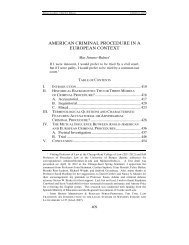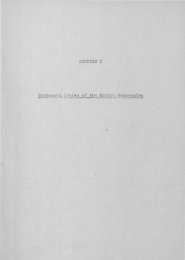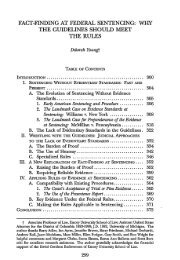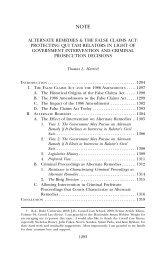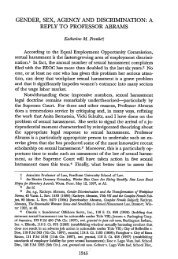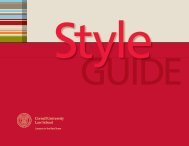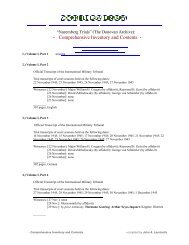JUDICIAL CLERKSHIP HANDBOOK - Cornell University Law School
JUDICIAL CLERKSHIP HANDBOOK - Cornell University Law School
JUDICIAL CLERKSHIP HANDBOOK - Cornell University Law School
You also want an ePaper? Increase the reach of your titles
YUMPU automatically turns print PDFs into web optimized ePapers that Google loves.
consent of all parties. Therefore, a magistrate clerk=s duties are similar to the duties of a<br />
district court judge=s clerk, i.e., writing legal memoranda, assisting with courtroom<br />
proceedings, and drafting opinions and recommendations. Note that the appropriate title<br />
to address the Magistrate by is AJudge.”<br />
U.S. COURTS OF APPEALS<br />
The district courts are grouped into circuits (the first through the eleventh circuit and the<br />
D.C. circuit) with one court of appeals in each circuit. The courts of appeals consider<br />
appeals from their district courts and review rulings of administrative tribunals such as the<br />
Board of Immigration Appeal and the National Labor Relations Board. There is also a Court<br />
of Appeals for the Federal Circuit which is located in Washington, D.C. This court has<br />
jurisdiction over appeals from district courts in cases involving patents and certain claims<br />
against the United States, the U.S. Claims Court, the Court of International Trade, the Court<br />
of Veterans Affairs, the Merit Systems Protection Board, the Patent and Trademark Office,<br />
the boards that decide government contract issues, and a few other Article I agencies.<br />
The principal function of the clerk for an appellate judge is to research the issues of law and<br />
fact presented by an appeal and review transcripts of proceedings below for errors by the<br />
trial judge or counsel. <strong>Law</strong> clerks may be required to prepare bench memos, assist the<br />
judge in preparing for oral argument, draft an opinion pursuant to a judge=s directions, or to<br />
edit and cite check opinions written by the judge. Appellate clerks do attend oral<br />
arguments; however, there is significantly less time spent in court than at the trial level.<br />
Appellate opinions typically contain an exhaustive and detailed analysis of the law, and<br />
these opinions are frequently published.<br />
STAFF ATTORNEYS AND PRO SE CLERKS<br />
In addition to clerkship positions with individual judges, all of the federal circuit courts and<br />
some of the federal district courts also have staff attorney and/or pro se law clerk positions<br />
available. Titles and duties vary somewhat from jurisdiction to jurisdiction, but in general it<br />
can be said that staff attorneys and pro se law clerks perform many of the same tasks<br />
performed by law clerks for individual judges, but they work for the court as a whole or for<br />
particular panels of judges. These tasks include legal research and preparation of<br />
memoranda, dispositions, and orders in various areas of federal law. Typically, at least one‐<br />
half of the cases handled by a staff attorney are cases in which one party is proceding pro<br />
se. Some courts, especially the circuit courts, handle a large number of pro se matters and,<br />
therefore, have pro se clerks who handle these cases exclusively.<br />
The staff attorneys= or pro se law clerks= office may work under the supervision of the chief<br />
judge, a committee of judges, a single judge, a senior attorney, the circuit executive, or the<br />
clerk of the court. The basic criteria used for selecting staff attorneys do not differ from<br />
those used by the judges in selecting their personal Aelbow@ clerks. A demonstrated<br />
interest in and commitment to public interest law is a big plus for positions involving a<br />
substantial number of pro se cases. Some courts classify staff attorney and pro se law clerk<br />
4 | P age




